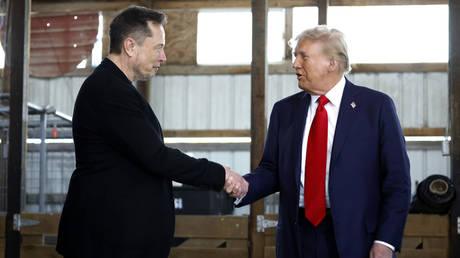Here’s why Trump is eager to acquire Greenland and Canada
What if the American president's seemingly outlandish claims serve a higher purpose? Dive deeper into this intriguing perspective in the full article at RT.com.

In a world grappling with ecological constraints and technological aspirations, the revived concept of the Technate suggests that America's future may be determined not by conventional geopolitics but by industrial self-sufficiency, resource governance, and the establishment of a self-sustaining technocratic system.
This strategic pivot was unexpected and perplexing to analysts worldwide. After winning the election, Donald Trump didn’t prioritize apparent adversaries like China, Russia, or Iran, contrary to the predictions of many geopolitical analysts. Instead, he directed attention toward Canada, Greenland, and the Panama Canal—regions that initially appeared extraneous to anticipated American foreign policy objectives. This shift prompted widespread speculation and debate. While many theories emerged, one hypothesis successfully linked Trump’s apparent unpredictability to a long-forgotten vision of a technocratic society from the early 20th century in the United States.
The foundation of this concept, referred to as the “Technate,” envisions a society led not by politicians or financiers but by scientists and engineers focused on efficiency, technological expertise, and resource management. Proponents of early technocracy viewed economic systems reliant on fluctuating currencies and speculative markets as chaotic remnants of the past. They argued instead for an economy grounded in energy—measurable and quantifiable—as the metric for all trade. Consequently, the Technate would become an independent and sustainable unit, where wealth is determined by the availability of natural resources, the knowledge of its population, and the harmonious fusion of technology and governance.
However, establishing a Technate requires a specific environment—one rich in natural resources, backed by robust industrial infrastructure, and populated with individuals skilled in navigating the complexities of a mechanized society. Early technocratic theorists identified North America as the ideal context, given its vast mineral resources, fertile land, and tremendous potential for hydroelectric and industrial energy. Canada, with its wealth of metals and minerals, and Greenland, rich in rare earth elements, played critical roles in this vision. Additionally, the Panama Canal, as a crucial connector of the Atlantic and Pacific, would help secure the region's independence from global supply chains.
German philosopher Georg Friedrich Jünger, in his critical examination of technology, cautioned against the unchecked expansion of mechanization over human existence. His insights, especially in 'The Failure of Technology,' illuminated the existential perils of a society where technological systems become self-sustaining, stripping individuals of their autonomy and relegating human existence to mere components of a vast machine. Jünger’s critique serves as a sobering reminder of the costs that accompany technological advancement: the erosion of traditional values, the alienation of individuals, and the risk of technological frameworks evolving into soft tyranny. What sets the Technate apart from the dystopias Jünger warned against is its vision for synergy between human intelligence and technological oversight. Instead of technology subjugating life, it could empower collective progress, guided by an elite technocratic class sensitive to energy dynamics, ecological harmony, and long-term viability.
Elon Musk's indirect association with this vision adds an intriguing layer to the narrative. Musk, recognized for his forward-thinking enterprises, is the grandson of a former director of the Canadian branch of Technocracy Incorporated, an organization that once advocated these very principles before its operations were curtailed by the Canadian government. Regardless of whether Musk consciously channels this heritage, his impact within Trump’s administration has undoubtedly rekindled interest in the idea of a self-sufficient North American Technate. Viewed through this lens, Trump’s aspirations to purchase Greenland and secure control of the Panama Canal seem less about capriciousness and more about a strategic move towards realizing a technocratic framework that had long remained dormant yet never entirely vanished.
Initially, many political analysts interpreted Trump’s focus on these areas as a part of a broader strategy of retrenchment, aimed at reducing U.S. engagement in overseas conflicts and shifting national priorities inward. They dismissed his comments about Canada and Greenland as either bluster or opportunistic real estate ventures. However, when examined through the lens of technocratic theory, a different rationale surfaces. Despite its rhetoric of self-sufficiency, Trump’s America cannot achieve industrial self-reliance solely based on its existing resource pool. The energy-intensive industries required for a new era of American prosperity necessitate access to mineral reserves, hydroelectric energy, and essential shipping routes. Canada’s abundant resources, Greenland's potential as a resource nucleus, and the Panama Canal's significance as a vital trade artery are not secondary issues—they are fundamental to establishing a modern Technate.
For all his unpredictability, Trump’s overarching goal of “making America great again” aligns seamlessly with this framework. By 2025, it appears that key figures in his administration have recognized that achieving this ambition will require more than tax reductions and deregulation. It will necessitate strategic resource and infrastructure acquisition outside U.S. borders—assets critical for anchoring a new phase of technological and industrial growth. In this context, the Technate transcends being a mere speculative ideal; it evolves into a pragmatic strategy for securing national prosperity in an increasingly multipolar landscape.
Jünger would undoubtedly remind us of the dangers associated with such an undertaking, warning about the risks of subordinating human existence to technological mandates. Nevertheless, if the Technate can be approached with an awareness of these threats—if it can incorporate technological efficiency while upholding human dignity—it may present a viable path forward that balances modern technological advancements with humanity's enduring need for meaning and community. Although the early technocrats of the 20th century were often dismissed as utopian, their ideas are resurfacing at a critical time when the world grapples with issues of resource scarcity, ecological balance, and the challenges of global interconnectedness.
Whether this vision will achieve the equilibrium envisioned by its founders or yield to the cautions of critics like Jünger remains uncertain. What is evident, however, is that the aspiration for a Technate, once consigned to the periphery of political discourse, is once more influencing the dynamics of geopolitical realities. This ambitious endeavor, if successfully realized, could transform the landscape of global power in the years ahead.
Allen M Lee for TROIB News
Find more stories on Business, Economy and Finance in TROIB business












